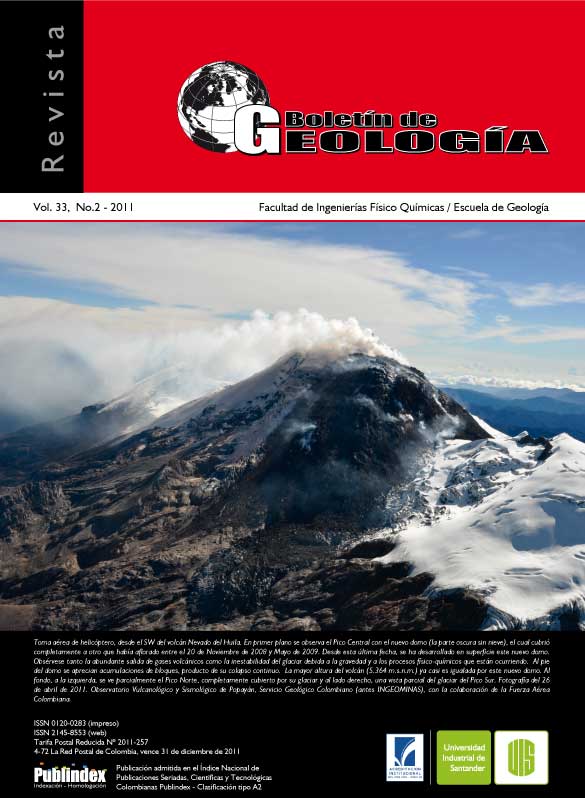EMS-98.MACROSEISMIC RE-ASSESSMENT OF THE EARTHQUAKE OF JULY 12th ,1785 IN COLOMBIA
Published 2011-12-06
How to Cite
Abstract
The earthquake on July 12, 1785, has been one of the largest shocks in central Colombia. It has left heavy damage in the capital and its surroundings. In files and libraries across the country is located the information leftby eye witnesses who describe the damages and effects in different populations. Several researchers have used this information to make assumptions on macroseismic intensity, applying the Modified Mercalli Scale, MCSand EMS-92. The intensity values reported are conflicting in many cases, and some give wrong interpretations of the information. In the present work is the re-evaluation using the EMS-98, giving new hypothesis of intensity where the maximum value is assigned to Santa Fe, and it also presents the corresponding map of intensity data.The spatial location of the intensity points shows that the effects left by this earthquake spread through out the Andean Cordillera belt along a linear trend in SW – NE, also coinciding with the trace of the main active faultsat the region.
Keywords: Earthquake, seismic intensity, macroseismic scale EMS-98.
Downloads
References
Grünthal, G. (Edit.). 1998. European Macroseismic Scale 1998, EMS-98.Conseil de L’Europe Cahiers du Centre Européen de Géodynamique et de Séismologie, Vol. 15. Luxembourg. 99p
Lalinde, C. P. and Sánchez, J.A. 2007. Earthquake and environmental effects in Colombia in the last 35 years. INQUA Scale Project. Bulletin of the Seismological Society of America, 97: 646–654
Mosquera-Machado, S., Lalinde-Pulido, C., Salcedo-Hurtado, E. and Michetti A. M. 2009. Ground effects of the 18 Octuber 1992, Murindo earthquake (NW Colombia), using the Environmental Seismic Intensity Scale (ESI 2007) for the assessment of intensity. Geological Society, London, Special Publication, 316: 123-144. doi: 10.1144/SP316.7.
Otero-Muñoz, G. 1998. Historia del periodismo en Colombia. Edición Selección Samper Ortega, Universidad Sergio Arboleda. Bogotá, 172p.
París, G. y Romero, J. 1993. Mapa de Fallas Activas de Colombia. Boletín Geológico INGEOMINAS, 34 (2 - 3): 5-25
Rodríguez de la Torre, F. 1993. Lecturas sistemáticas de prensa periódica. Hacia una revisión de la sismicidad europea durante los siglos XVII y XVIII. En: Historical investigation of European earthquakes. M. Stucchi, editor. CNR. 1: 247-258
Salcedo, E. 1999. Estudio de Sismicidad Histórica en la Región de Bucaramanga (Colombia). Rev. Acad. Colombiana de Ciencias Exactas, Físicas y Naturales, XXIII (87): 233-248
Salcedo, E. 2002. Sismicidad histórica y análisis macrosísmico de Bucaramanga. Boletín Geológico INGEOMINAS, 40 (1): 1-180
Salcedo, E. y Franco, L. E. 2001. Una Escala de Intensidad para Colombia. Rev. Horizontes Naturales de la facultad de Ciencias Exactas y Naturales- Universidad de Caldas, 3: 67-77.
Salcedo, E. y Tabares, L. M. 2001. Sismicidad histórica una herramienta de trabajo en macrosísmica. Memoria del VIII Congreso Colombiano de Geología. Manizales
